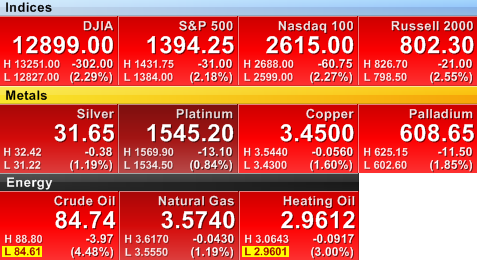Postelection market drop is no cause for panic
Post on: 15 Май, 2015 No Comment

Story Highlights
- Most investors should do nothing Sell only if you have a good reason The next few months could be volatile
The Dow Jones industrial average is down more than 285 points. What should you do?
Most investors should do nothing, assuming you own stocks or stock mutual funds as part of a long-term investment strategy, and you plan to own your stocks for 10 years or more. Unless this is a much, much larger drop by the end of the day, in 10 years you won’t remember Nov. 7, 2012, as much more than the day after Election Day.
Make no mistake: The next few months will probably be rocky, as the government wrestles with the fiscal cliff and the debt ceiling.
And problems in the eurozone are far from over and could get worse before those economies improve. If you hate volatility, you’re going to hate this market.
Nevertheless, on days like today, much of the trading is done by the real herd on the Street: institutional traders. They generally don’t pay taxes on their gains, and can negotiate trading costs far lower than you can. And it’s usually not their money they’re trading in the first place. While they can get fired for losing a ton of money, surprisingly few do.
Following them will simply rack up taxes and commissions that increase your investment costs. We’re talking your savings here, and you shouldn’t trade lightly.
That said, selling stocks is not the same as selling body parts.You might consider selling if:
• You’ll need the money relatively soon. If you sell, you’ll have to park your proceeds in a savings account or a money market account, so you’ll make virtually nothing in interest. On the other hand, you won’t lose anything.
• You have a losing position. Sell now, and you can use your losses to offset an unlimited amount of capital gains, over several years if necessary. If your losses are more than your gains, you can deduct $3,000 from your income in 2012, and carry additional losses into the 2013 tax year and beyond. If you really like the stock, or the fund, you can buy it back in 30 days without the IRS declaring the loss invalid.
• You have a large gain, you don’t like the stock any more, and you think capital gains taxes will rise next year. You may as well take your gain and pay taxes at current low rates. Speculating on tax policy, however, can be a risky business.
Optimistic (and aggressive) investors might use some of the carnage to pick up shares of companies that have been smacked. If you were lamenting not owning Apple during its runup, well, you now have a chance to buy it for 20% below its all-time high price. You’ll never get a deal like that for an iPad.














